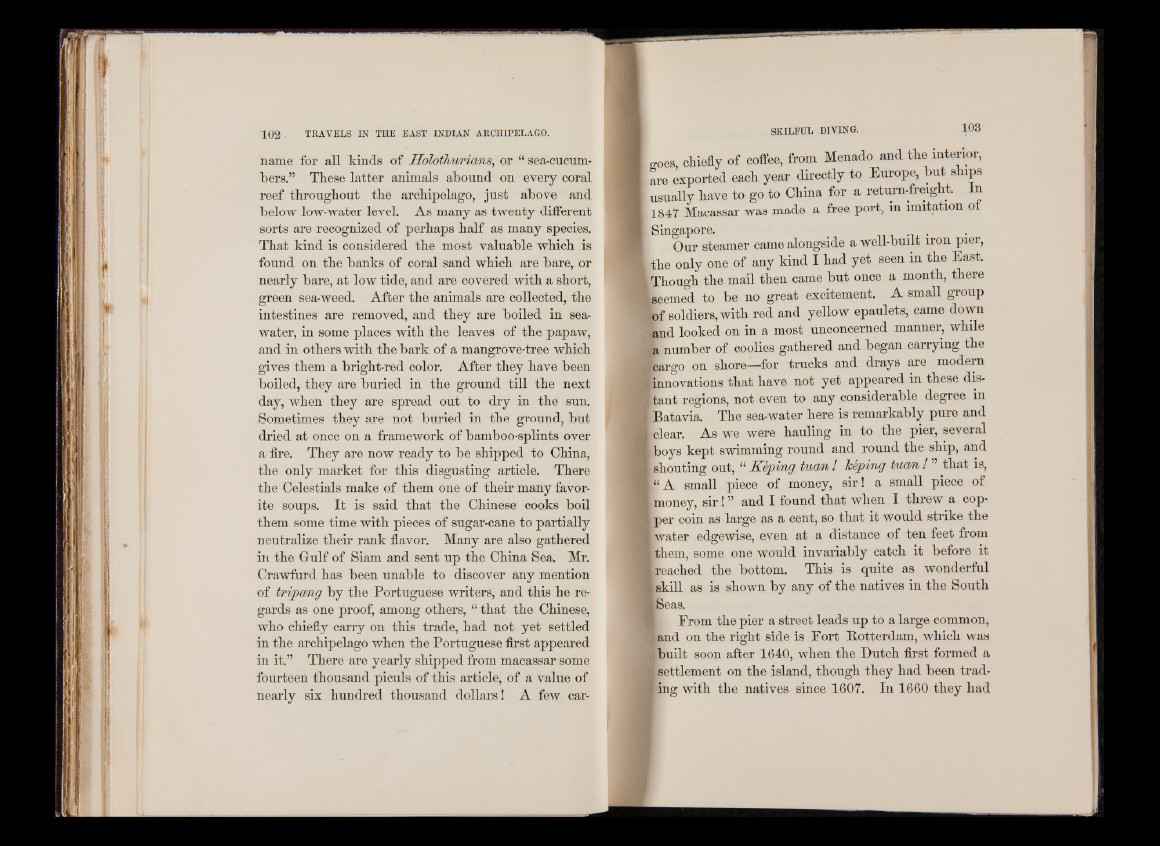
name for all kinds of HolotJiurians, or a sea-cucum-
bers.” These latter animals abound on every coral
reef throughout the archipelago, just above and
below low-water level. As many as twenty different
sorts are recognized of perhaps half as many species.
That kind is considered the most valuable which is
found on the banks of coral sand which are bare, or
nearly bare, at low tide, and are covered with a short,
green sea-weed. After the animals are collected, the
intestines are removed, and they are boiled in seawater,
in some places with the leaves of the papaw,
and in others with the bark of a mangrove-tree which
gives them a bright-red color. After they have been
boiled, they are buried in the ground till the next
day, when they are spread out to dry in the sun.
Sometimes they are not buried in the ground, but
dried at once on a framework of bamboo-splints over
a fire. They are now ready to be shipped to China,
the only market for this disgusting article. There
the Celestials make of them one of their many favorite
soups. It is said that the Chinese cooks boil
them some time with pieces of sugar-cane to partially
neutralize their rank flavor. Many are also gathered
in the Gulf of Siam and sent up the China Sea. Mr.
Crawfurd has been unable to discover any mention
of 1/ripa/ng by the Portuguese writers, and this he regards
as one proof, among others, “ that the Chinese,
who chiefly carry on this trade, had not yet settled
in the archipelago when the Portuguese first appeared
in it.” There are yearly shipped from macassar some
fourteen thousand piculs of this article, of a value of
nearly six hundred thousand dollars! A few cargoes
chiefly of coffee, from Menado and the interior,
are exported each year directly to Europe, but ships
usually have to go to China for a return-freight. In
1847 Macassar was made a free port, in imitation o
. Singapore.
Our steamer came alongside a well-built iron pier,
; the only one of any kind I had yet seen in the East.
[Though the mail then came but once a month, there
Leemed to be no great excitement. A small group
of soldiers, with red and yellow epaulets, came down
and looked on in a most unconcerned manner, while
a number of coolies gathered and began carrying the
Cargo on shore—for trucks and drays are modern
Iinnovations that have not yet appeared in these dis-
I tant regions, not even to any considerable degree in
Batavia. The sea-water here is remarkably pure and
I clear. As we were hauling in to the pier, several
I boys kept swimming round and round the ship, and
[ shouting out, “ Képing tucun ! T&eping tucm ! ” that is,
1“ A small piece of money, sir! a small piece of
I money, s ir! ” and I found that when I threw a cop-
iper coin as large as a cent, so that it would strike the
1 water edgewise, even at a distance of ten feet from
■ them, some one would invariably catch it before it
■reached the bottom. This is quite as wonderful
■skill as is shown by any of the natives in the South
■Seas.
From the pier a street leads up to a large common,
Rand on the right side is Fort Rotterdam, which was
built soon after 1640, when the Dutch first formed a
■ settlement on the island, though they had been trad-
■ ing with the natives since 1607. In 1660 they had